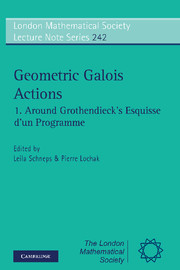Book contents
- Frontmatter
- Contents
- Preface
- ESQUISSE D'UN PROGRAMME
- Esquisse d'un Programme
- Brief an G. Faltings
- Grothendieck's “Long March through Galois theory”
- The algebraic fundamental group
- Etale homotopy type of the moduli spaces of algebraic curves
- The ‘obvious’ part of Belyi's theorem and Riemann surfaces with many automorphisms
- Glimpses of Grothendieck's anabelian geometry
- Some illustrative examples for anabelian geometry in high dimensions
- The fundamental groups at infinity of the moduli spaces of curves
- Galois representations in the profinite Teichmüller modular groups
- Deux lettres sur la cohomologie non abélienne
- The Grothendieck-Teichmüller group GT: a survey
- Approximating Galois orbits of dessins
- Tame and stratified objects
- Sketch of a Programme (translation into English)
- Letter to G. Faltings (translation into English)
Letter to G. Faltings (translation into English)
Published online by Cambridge University Press: 05 April 2013
- Frontmatter
- Contents
- Preface
- ESQUISSE D'UN PROGRAMME
- Esquisse d'un Programme
- Brief an G. Faltings
- Grothendieck's “Long March through Galois theory”
- The algebraic fundamental group
- Etale homotopy type of the moduli spaces of algebraic curves
- The ‘obvious’ part of Belyi's theorem and Riemann surfaces with many automorphisms
- Glimpses of Grothendieck's anabelian geometry
- Some illustrative examples for anabelian geometry in high dimensions
- The fundamental groups at infinity of the moduli spaces of curves
- Galois representations in the profinite Teichmüller modular groups
- Deux lettres sur la cohomologie non abélienne
- The Grothendieck-Teichmüller group GT: a survey
- Approximating Galois orbits of dessins
- Tame and stratified objects
- Sketch of a Programme (translation into English)
- Letter to G. Faltings (translation into English)
Summary
Dear Mr. Faltings,
Many thanks for your quick answer and for sending me your reprints! Your comments on the so-called “Theory of Motives” are of the usual kind, and for a large part can be traced to a tradition which is deeply rooted in mathematics. Namely that research (possibly long and exacting) and attention is devoted only to mathematical situations and relations for which one entertains not merely the hope of coming to a provisional, possibly in part conjectural understanding of a hitherto mysterious region – as it has indeed been and should be the case in the natural sciences – but also at the same time the prospect of a possibility of permanently supporting the newly gained insights by means of conclusive arguments. This attitude now appears to me as an extraordinarily strong psychological obstacle to the development of the visionary power in mathematics, and therefore also to the progress of mathematical insight in the usual sense, namely the insight which is sufficiently penetrating or comprehending to finally lead to a “proof”. What my experience of mathematical work has taught me again and again, is that the proof always springs from the insight, and not the other way round – and that the insight itself has its source, first and foremost, in a delicate and obstinate feeling of the relevant entities and concepts and their mutual relations.
- Type
- Chapter
- Information
- Geometric Galois Actions , pp. 285 - 293Publisher: Cambridge University PressPrint publication year: 1997

